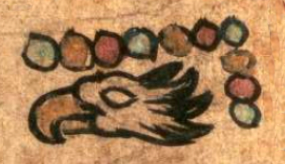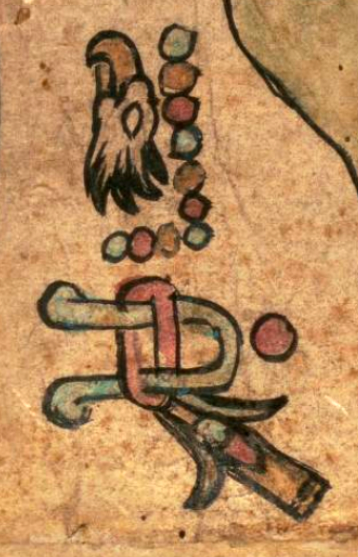Matlactli Cuauhtli (CQ)
This simplex glyph-plus-notation represents the personal name (and date) Matlactli Cuauhtli (Ten Eagle). It consists of ten ones above and to the side of the head of an eagle, shown in profile, facing to the viewer's left. The ones are colored in a repeating pattern, turquoise-yellow-red. Seven ones form a horizontal line at the top and three go down the right side. Unusually, they are not presented as two groups of five, which would be a common way of showing ten (the fingers on two hands). The eagle's head is white (or neutral) with black feathers around its neck. Its yellow beak is closed. Its eye may be open; it is left neutral.
Stephanie Wood
Ten Eagle is a calendrical name. Calendrics were an important part of Mesoamericans' religious views of the cosmos.
Stephanie Wood
covers ruling men and women of Tecamachalco through 1593
ten, diez, eagle, águila, numbers, números, dates, fetchas, birds, pajaros, aves, day, día, feathers, plumas, mahtlactli, nombres de hombres

Diez Águila, 10-Águila
The Codex Quetzalecatzin, aka Mapa de Ecatepec-Huitziltepec, Codex Ehecatepec-Huitziltepec, or Charles Ratton Codex. Library of Congress. https://www.loc.gov/item/2017590521/
The Library of Congress, current custodian of this pictorial Mexican manuscript, hosts a digital version online. It is not copyright protected.




